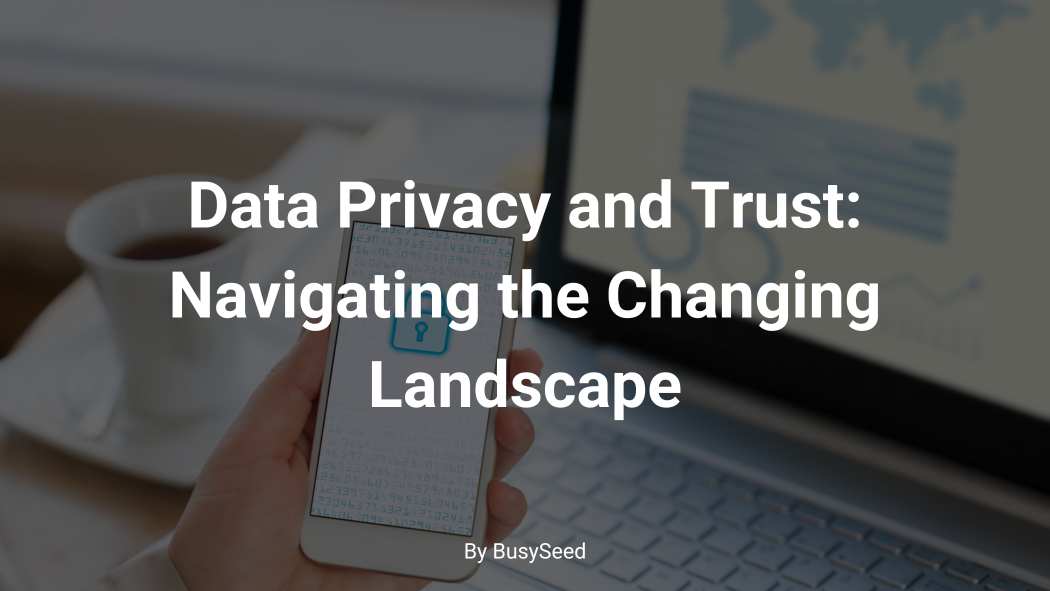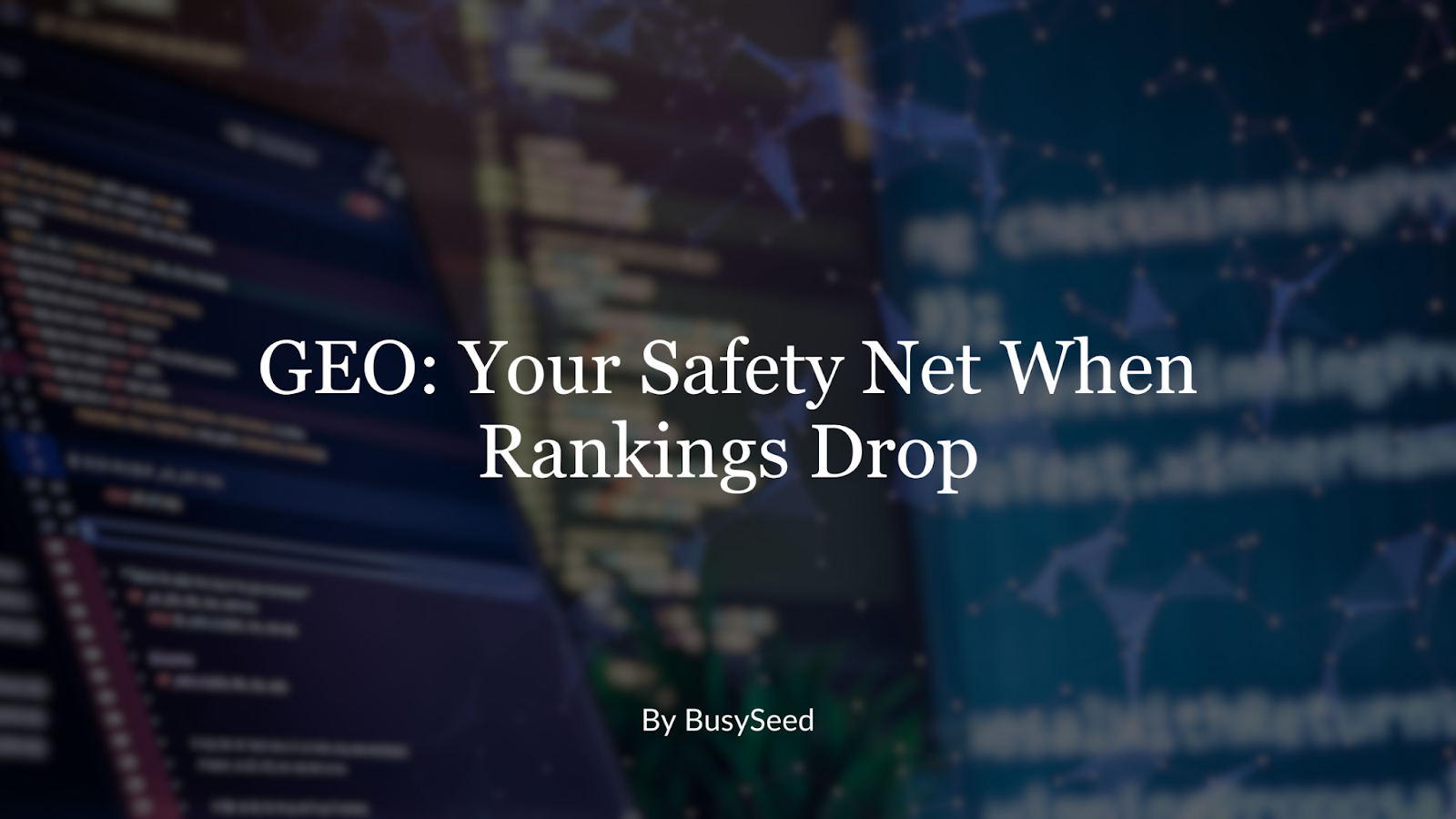Data Privacy and Trust: Navigating the Changing Landscape
Navigate the changing landscape of data privacy and build trust with your audience in the digital realm. Stay updated on privacy regulations, implement transparent data practices, and prioritize data security to protect user information, enhance customer trust, and establish a competitive advantage in an era where privacy concerns are at the forefront of consumers' minds.

In the digital realm, where data privacy and trust are paramount, businesses face the challenge of navigating a rapidly changing landscape. With privacy concerns at the forefront of consumers' minds, it has become imperative to stay updated on privacy regulations, implement transparent data practices, and prioritize data security.
By doing so, businesses can protect user information, enhance customer trust, and establish a competitive advantage. As the number one digital marketing agency out of 63,000, BusySeed is uniquely positioned to guide you through this journey.
I. Navigating Privacy Regulations
It's essential to keep up with privacy laws and modify your data practices to successfully traverse the evolving data privacy landscape. This entails paying close attention to any revisions or modifications to current regulations and comprehending the ramifications for your company. Privacy regulations, such as the General Data Protection Regulation (GDPR) and the California Consumer Privacy Act (CCPA), have brought about significant changes in how businesses handle data and data privacy. You may stay compliant and uphold a high degree of confidence with your audience by routinely evaluating and upgrading your privacy policies to be compliant with all necessary privacy regulations.
Not only is adherence to these rules required by law, but it is also an essential first step in developing trust. Businesses make a strong statement that their customers' privacy and trust are respected when they prioritize protecting their customer's data and following privacy laws. By making sure your data practices comply with the most recent regulations, you show that you are dedicated to protecting user data and upholding their right to data privacy.
By making privacy laws a priority, you show that you value openness, responsibility, and user-centric data practices. As a result, your audience will feel more confident and trust you, knowing that their personal information is secure.
II. Implementing Transparent Data Practices
Building trust with your audience is based on transparency, especially when it comes to data privacy. Businesses must implement open data standards to build credibility and confidence. This is because, in today's digital environment, worries about how personal information is gathered and utilized are pervasive. Let's see how you can implement transparent data practices.
1. The Power of Clear Privacy Policies
Offering succinct and clear privacy rules is one of the best ways to implement transparent data practices. Individuals can use privacy policies as a road map to understand how their data is gathered, handled, and safeguarded. Privacy policies should be publicly published on your website and easy to access from any page to ensure accessibility. To avoid giving the impression that they are secret, don't bury them far inside your website.
2. Simplifying Language for Accessibility
It is crucial to write privacy policies in straightforward language that everyone, regardless of technical proficiency, can understand. Avoid using technical language or legalese that could mislead or alienate readers. By providing information straightforwardly and understandably, you show users that you value transparency and make it simpler for them to understand how their data is handled.
3. Being Transparent about Third-Party Data Sharing
It is essential to be upfront about any third parties with whom you share user data, in addition to establishing your data collection and storage policies. Provide information about these parties' names, the reason they shared the data, and the way they handled it. This level of openness enables users to evaluate the risks involved in disclosing their personal information and make educated privacy decisions.
4. Empowering Users with Data Control Options
Consider giving people the ability to manage their data as well. Implement controls that make it simple for people to opt in or out of specific data gathering and processing operations. Provide customers with as many granular options as you can, letting them customize their privacy preferences to suit their comfort levels. You build trust and respect for people's privacy preferences by giving them power over their data.
5. Regular Review and Updates for Ongoing Transparency
To ensure transparency, your privacy policies need to be reviewed and updated frequently. Make sure your rules appropriately reflect the changes as your company grows and new data practices develop. Inform your audience of any updates, emphasizing the changes made and outlining how they help the user.
All in all, businesses can establish themselves as reliable custodians of personal information by adopting transparent data practices and offering clear and simple privacy policies. You can create enduring credibility and trust in the digital sphere by adopting transparency as a fundamental principle.
III. Prioritizing Data Security
To navigate the changing landscape of data privacy successfully, businesses must prioritize data security while staying updated on privacy regulations. As cyber threats continue to evolve and become more sophisticated, safeguarding user information is no longer a choice but a necessity. But how can you do it?
1. Cutting-Edge Encryption: Shielding Your Valuable Data
By implementing cutting-edge encryption methods, businesses can ensure that sensitive data remains secure even if it falls into the wrong hands. Encryption adds an extra layer of protection by encoding the data, making it unreadable to unauthorized individuals.
2. Vigilance through Regular Security Audits and Risk Assessments
Regular security audits and risk assessments are essential components of an effective data security strategy. These measures allow businesses to identify vulnerabilities, evaluate potential risks, and implement necessary safeguards to mitigate threats. By conducting audits and assessments regularly, businesses can stay proactive in their approach to data security and address any potential weaknesses promptly.
3. Empowering Employees: Guardians of Data Security
Training employees on data security best practices is another critical aspect of prioritizing data security. Human error and negligence are often the weakest links in the security chain. By providing comprehensive training and education, businesses can ensure that employees are aware of potential threats, understand their responsibilities in protecting data, and follow best practices to minimize risks.
By leaving no stone unturned in their efforts to protect data from unauthorized access and breaches, businesses demonstrate their commitment to data security and the privacy of their audience. This proactive approach not only safeguards sensitive information but also builds trust with customers.
The Bottomline: Transform Your Digital Journey with BusySeed
Navigating the complexity of this constantly changing environment of data privacy and trust can be difficult. But at BusySeed, we're experts at assisting companies in taking on these difficulties head-on. We stand out from the competition thanks to our superior knowledge as the leading digital marketing agency and our dedication to data privacy and trust. Look no further if you want to safeguard user data, increase client confidence, and get a competitive edge. Come to BusySeed right now, and let us show you the way to success in the online world.
Keep in mind that we are not just one of the best digital marketing agencies—out of 63,000, we are the best. We are exceptional, successful, and devoted. Let's work together to establish a solid foundation of trust, protect user data, and grow your business to new heights.











